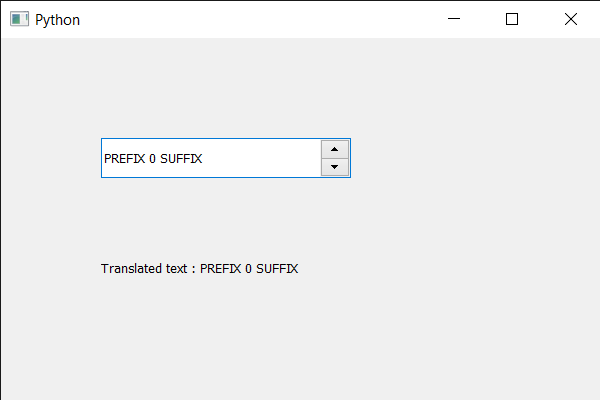En este artículo veremos cómo podemos obtener la versión traducida del texto. La versión traducida del texto se basa en la string de desambiguación y el valor de n para strings que contienen plurales. Si no hay una string traducida adecuada disponible, el texto traducido será una string UTF-8, es decir, un códec Unicode y puede representar todos los caracteres en una string Unicode como QString. Sin embargo, las secuencias no válidas son posibles con UTF-8 y, si se encuentran, se reemplazarán con uno o más «caracteres de reemplazo» o se suprimirán.
Para hacer esto, usamos trel método con el objeto de cuadro de número.
Sintaxis: spin_box.tr(texto, d_texto, n)
Argumento: se necesitan 3 argumentos, el primero es el texto y los otros dos no son obligatorios, el primero es la string de desambiguación y el otro es el número entero que se refiere al número de plurales.
Retorno: Devuelve string
A continuación se muestra la implementación.
# importing libraries
from PyQt5.QtWidgets import *
from PyQt5 import QtCore, QtGui
from PyQt5.QtGui import *
from PyQt5.QtCore import *
import sys
class Window(QMainWindow):
def __init__(self):
super().__init__()
# setting title
self.setWindowTitle("Python ")
# setting geometry
self.setGeometry(100, 100, 600, 400)
# calling method
self.UiComponents()
# showing all the widgets
self.show()
# method for widgets
def UiComponents(self):
# creating spin box
self.spin = QSpinBox(self)
# setting geometry to spin box
self.spin.setGeometry(100, 100, 250, 40)
# setting range to the spin box
self.spin.setRange(0, 999999)
# setting prefix to spin
self.spin.setPrefix("PREFIX ")
# setting suffix to spin
self.spin.setSuffix(" SUFFIX")
# setting status tip to the spin box
self.spin.setStatusTip("Small Value")
# creating a label
self.label = QLabel(self)
# making label multi line
self.label.setWordWrap(True)
# setting label geometry
self.label.setGeometry(100, 200, 250, 60)
# translating the text
value = self.spin.tr(self.spin.text())
# setting text to the label
self.label.setText("Translated text : " + str(value))
# create pyqt5 app
App = QApplication(sys.argv)
# create the instance of our Window
window = Window()
# start the app
sys.exit(App.exec())
Producción :
Publicación traducida automáticamente
Artículo escrito por rakshitarora y traducido por Barcelona Geeks. The original can be accessed here. Licence: CCBY-SA